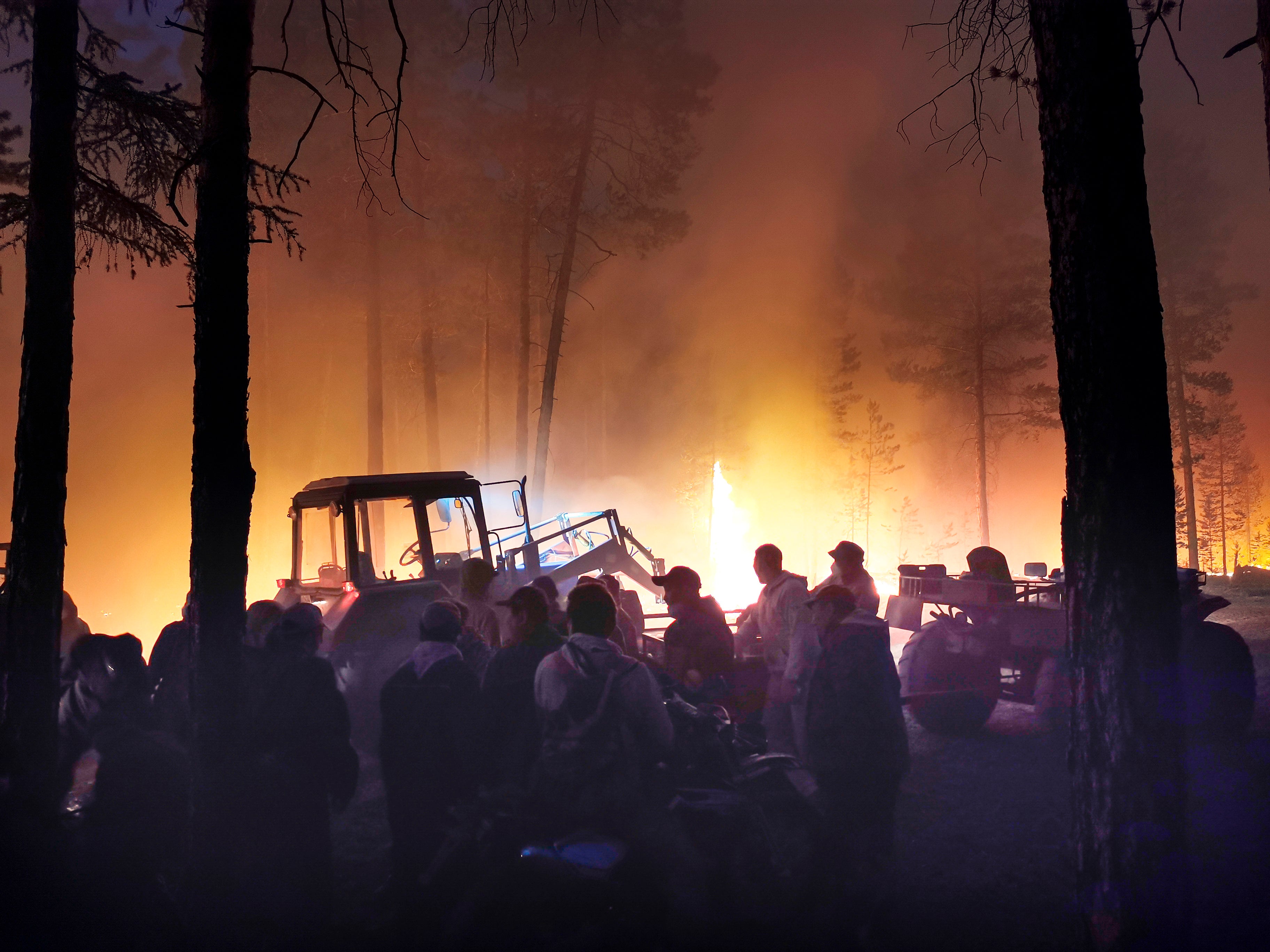Russia battles with ‘catastrophic’ wildfires as scrutiny turns to lack of fire defence funding
The wildfires, now in their fourth consecutive year, are burning vast swathes of forest land and creating a vicious climate change cycle

Wildfires are raging throughout Russia, overwhelming an overstretched firefighting service, and leaving desperate locals with little choice but to defend themselves however they can.
The summer may not set a record for forest fires in recent memory — that was likely set in 2003. But it is the fourth consecutive year of what Greenpeace describes as "catastrophic" burning.
It is a period without parallel since records began, and it threatens to feed an unstoppable cycle of climate change.
More than 9.4 million hectares of forest land have been reduced to cinders since the beginning of the year. The fires have mostly been concentrated in the northern region of Kareliya and Yakutiya, in the Far East. In Yakutia, many towns have been blanketed in a layer of smoke.
The blazes are a direct consequence of two indisputable effects of global warming: extreme weather swings and unusually hot summers. Much of Russia’s vast boreal forests have been desiccated by weeks of record temperatures, leaving them highly susceptible to lighting and arson.
Russia’s northern regions are additionally vulnerable as they are home to the permafrost, soil traditionally frozen deep in the ground all year round. Global warming has already thawed much of this protective layer, undermining centuries of geological equilibrium, and the roads and buildings built more recently on top of it.
This thawing process has the potential to cause huge economic damage — demonstrated by the massive 2020 oil spill in Norilsk, when a fuel storage tank buckled after permafrost supports failed.
But it is also unleashing a potentially unstoppable cycle of climate change, as greenhouse gases released during thawing contribute to further warming.
When blazes are repeated regularly they destroy more and more trees, allowing wind to travel unhindered. Young forests that eventually appear in their place burn much more easily
Most of this year’s wildfires are to the south of the main stretch of permafrost, and as such not directly feed into the process of its thawing. But they are part of the same interlinked set of processes that threatens to cause irreversible damage to the region.
Alexei Yaroshenko, head of Greenpeace’s forest program, told The Independent that global warming has affected Russia’s forests disproportionately. Over the last twenty years, the forest fire season has increased by an average of two to three weeks, he says. And fire is giving rise to more fire.
"When blazes are repeated regularly they destroy more and more trees, allowing wind to travel unhindered," he says. "Young forests that eventually appear in their place burn much more easily."
The challenge in a country like Russia is the huge distances involved. Remote Yakutia, for example, where upwards of 80 percent of the wildfires are located, is five times the size of France, but has a population smaller than Birmingham.
Much of the region has been designated a "control zone," where state firefighters leave forest fires to burn until they reach settlements. Here, frontline defence falls on local activists and volunteer firefighter organisations.
Overall, 30 percent of Russia’s forestland is designated a “control zone.” But an even larger section of woodlands also falls in bureaucratic gaps, without an official forest designation and thus generally ignored by state firefighters.
Kirill Bulashevich, a volunteer spending the summer patrolling remote islands at the north of Lake Ladoga in Kareliya, says groups like his are filling the gaps where the government once took responsibility. His group has been involved in putting out over thirty fires on the islands — already a record with two months of summer to go.
"They used to send smoke-jumpers and motor boats if there was a fire on one of the islands," he said. "Now there isn’t the cash, and they say the natural fire limits of an island are enough, ignoring the immense natural beauty of the place."
Money for firefighting has declined significantly in real terms since the collapse of the Soviet Union. A 2006 reform stripped local authorities of the ability to keep revenues from forestry, creating a massive budgetary hole. Regional forest protection agencies now receive about a third of what they need to do a proper job, claims Yaroshenko; and "about a tenth" in the case of Yakutia.
In election mode season ahead of September’s parliamentary vote, the Kremlin appears to be belatedly paying attention.
Daily broadcasts on state TV now feature the heroic work of state firefighters, aviation, and the army. Apocalyptic images of climate catastrophe are sandwiched by triumphant reports of success in extinguishing the fires. Less mention is made of the growing number of blazes and concerns other areas of eastern Siberia are about to become new hotspots.
At a televised meeting with government officials on Wednesday, Vladimir Putin also appeared to hint more money could be diverted to underfunded firefighting services. Federal government would play a larger role assisting sparsely populated regions, he said: "Several regions have been able to stop the fires quickly, but not everywhere has been able to do that.
But Greenpeace’s Yaroshenko said previous years suggested interest would not last beyond the election season.
"Every year, things follow a standard scenario," he said. "During summer, we’re told things need to change, but by the time budgets are decided in November, the fires are long extinguished, and there are more immediate demands on the cash."
Join our commenting forum
Join thought-provoking conversations, follow other Independent readers and see their replies
Comments
Bookmark popover
Removed from bookmarks